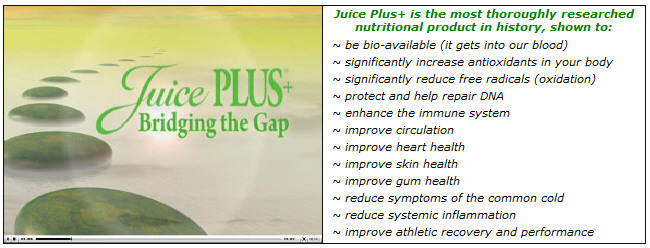Higher Fruit, Veggie Intake Tied to Lower Risk of a Tough-to-Treat Breast Cancer
www.health.com January 25, 2013

Eating plenty of fruits and vegetables may lower
women’s risk for a tough-to-treat form of breast cancer, but it does not
reduce their odds of getting breast cancer overall, a new study finds.
Specifically, the new study found lower rates of
what’s known as “estrogen receptor-negative breast cancer” among women who ate
high amounts of fruits and vegetables.
These tumors — which do not respond to
circulating estrogen — account for 15 percent to 20 percent of breast cancers,
and have a lower survival rate than other types of breast cancer.
According to a team led by Seungyoun Jung,
formerly at the department of nutrition at the Harvard School of Public
Health, previous research has suggested that consuming higher amounts of
fruits and vegetables might lower breast cancer risk, but there haven’t been
enough data to prove it.
In their new investigation, Jung’s team analyzed
data from 20 prior studies of women who were followed for a maximum of 11 to
20 years.
They found a statistically significant link
between higher fruit and vegetable consumption and a lower risk for estrogen
receptor-negative breast cancer, but not with a lower risk of estrogen
receptor-positive breast cancers (those that do respond to estrogen) or for
breast cancer overall.
The lower risk for estrogen receptor-negative
breast cancer was mostly associated with higher intake of vegetables, Jung’s
team noted in a journal news release.
Two breast cancer experts responded to the
findings with caution, noting that a cause-and-effect relationship is far from
certain.
“It is plausible that estrogen receptor-negative
breast cancer is influenced by nutritional factors,” said Dr. Paolo Boffetta,
director of the Institute for Translation Epidemiology at the Mount Sinai
Medical Center, in New York City.
“However, eating fruits and vegetables is
closely tied to environmental factors and healthy lifestyle, such as weight
control, physical activity and other healthy eating habits,” he noted. “Since
these are so closely tied together, it is difficult to disentangle the
specific effect of fruits and vegetables.”
And Dr. Stephanie Bernik, chief of surgical
oncology at Lenox Hill Hospital in New York City, agreed.
“The study fails to control for some bias that
may occur when observing the two populations,” she said. “Perhaps the women
that eat well also exercise, drink little alcohol, don’t smoke and eat less
animal fats overall.”
Still, living healthily is always a good idea,
and “the study does add some evidence that a healthy lifestyle can perhaps
help decrease the risk of breast cancer,” Bernik said.
The study was published Jan. 24 in the
Journal of the National Cancer Institute.
Related article: Vegetables with apigenin are key cancer fighters.
Juice Plus+ is not a 'supplement', but a wholefood-based
nutritional product that helps us bridge the gap between what we do eat and what
we need to eat, in terms of daily fruit and vegetable intake.
Please watch the video below concerning this important 'bridge'.
You can learn more about
Juice Plus+ and the medical research behind it
here.

|